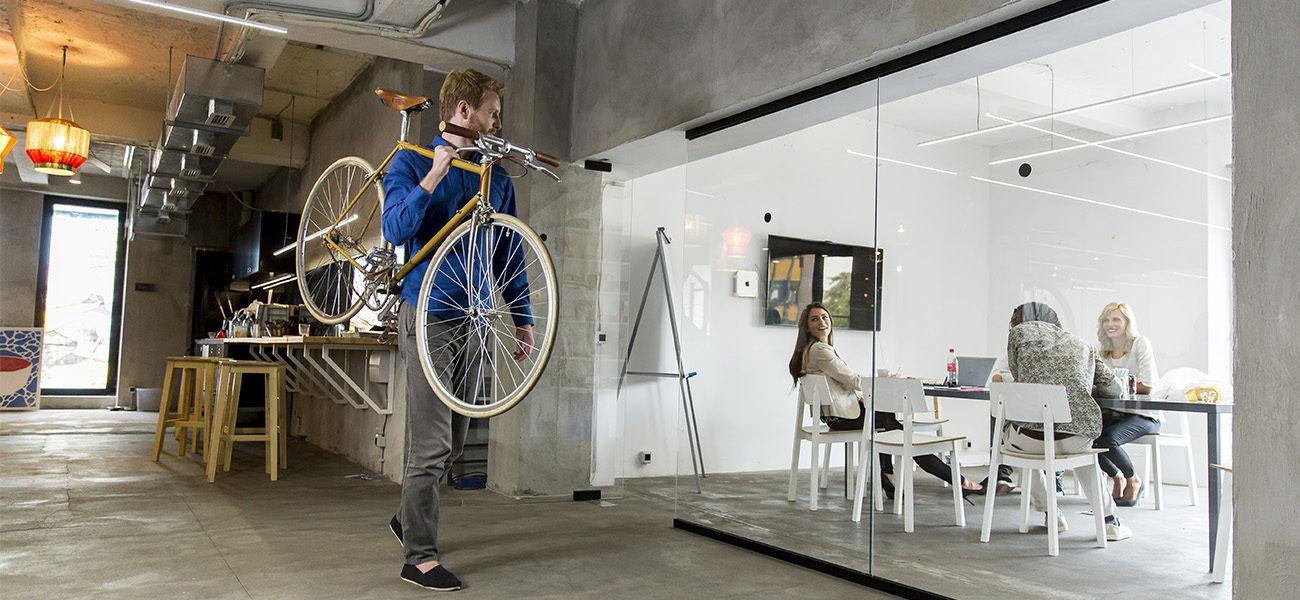
This Wednesday is Cycle to Work Day in the UK. The initiative encourages people to swap their usual mode of transport – whether that be train, the underground or their car – for a two-wheeled commute.
The aim, of course, is to champion the benefits of cycling, one of which is the health advantages associated with introducing physical exercise into your daily routine. But, can increasing your heart rate on the way to the office also impact what happens when you get there?
There’s plenty of reason to believe it can…
A Sharper Memory
Ever been caught off guard in a meeting? Left scrambling through your notes or unable to answer an important question from a client or colleague because you just can’t quite recall that vital piece of information?
Regular, moderate-intensity exercise can stimulate regions in the brain that are associated with memory function and slow down, or even reduce, cognitive decline. Specifically, physical activity releases a chemical called brain-derived neurotrophic factor (BDNF) which has been shown to improve memory. Whilst the indirect benefits of exercise include improved sleep and stress reduction – two things linked to poor memory.
According to research carried out by the University of British Columbia, benefits can be seen when 120 minutes of moderate-intensity aerobic exercise such as walking takes place each week.
Better Concentration
Whether it is letting your mind wander from time to time in the office (we’ve all been there) or struggling to keep on top of that growing to-do list, being able to concentrate on the task at hand is a valuable skill in the workplace.
Thankfully, stepping up your levels of physical activity by even just a small amount can help keep your eye on the ball and help block out distractions as you battle that all important deadline.
A U.S. study involving school children showed that introducing daily after-school sports classes not only improved the pupil’s overall fitness but led to improvements in multitasking, decision-making and retaining information. If it is good enough for the kids, it can be good enough for you too!
Boost Creativity
The same old commute. Squeezing onto the same train every morning and mindlessly scrolling through social media to pass the time. It’s not exactly conducive to coming up with the next great idea that will wow your boss, is it?

Physical exercise – such as walking or cycling into work – can help get the creative juices flowing, though, just by introducing you to new environments and letting your mind run free. Physical exercise also speeds up the growth of brain cells in the hippocampus region of the brain, and there is research to suggest this area is linked to creative thinking.
Prolong Mental Stamina
The corporate athlete is something you may have heard of and, like a successful long-distance runner at the Olympics, having good stamina can help you stay on track in the workplace.
Taking part in regular physical exercise (at the right time of the day) is known to help people regulate and improve their sleeping patterns. A good night’s sleep is crucial in allowing your body to recover from the trials and tribulations that have taken place that day, as well as setting you up to take on the day ahead.
Notice the Difference
Cycling to work or even a brisk walk can help kick-start this chain reaction and make sure you don’t hit the proverbial wall at work.
So, even if your Wednesday commute doesn’t begin on two wheels, it might be worth thinking about how you can start incorporating even a small amount of physical exercise into your weekly routine if you want to boost your productivity as well as your fitness.
Interested in supporting your well-being with accurate stress and recovery data?
You might also be interested in

A Good Night’s Sleep, What Does It Mean?
It is not just how much you sleep but also how well you sleep that counts. Firstbeat Sleep Quality Assessment takes into account the amount of sleep and the quality of the recovery.

How to Design Your Weekend to Boost Recovery for the Working Week
With Saturday many people’s ‘most stressful day’, your weekend might not be as full of recovery as you first thought. Here are tips to boost your recovery.

What is Presenteeism? And How Can We Fix the Multi-billion-pound Problem?
Paying proper attention to the well-being of staff will lead to a better working environment and happier, more productive employees.

